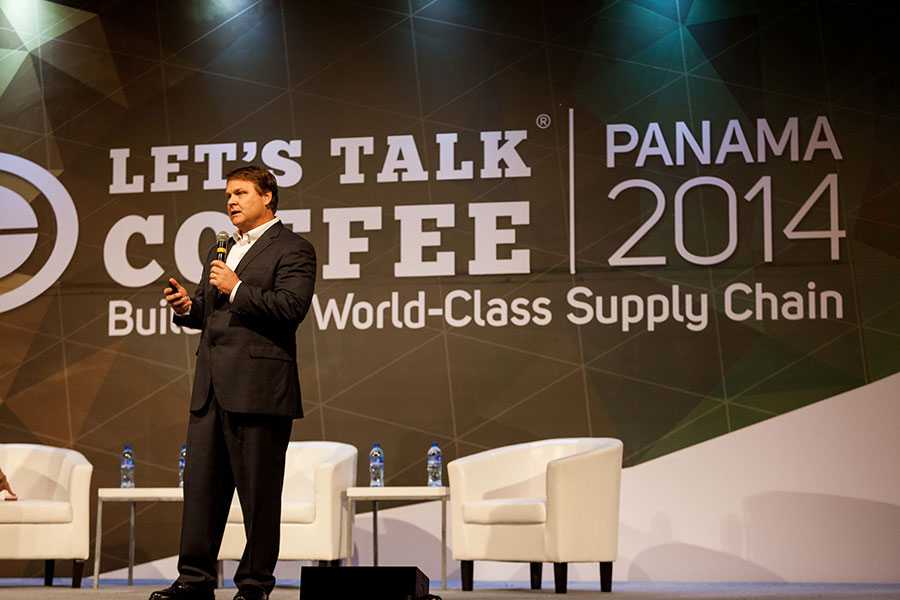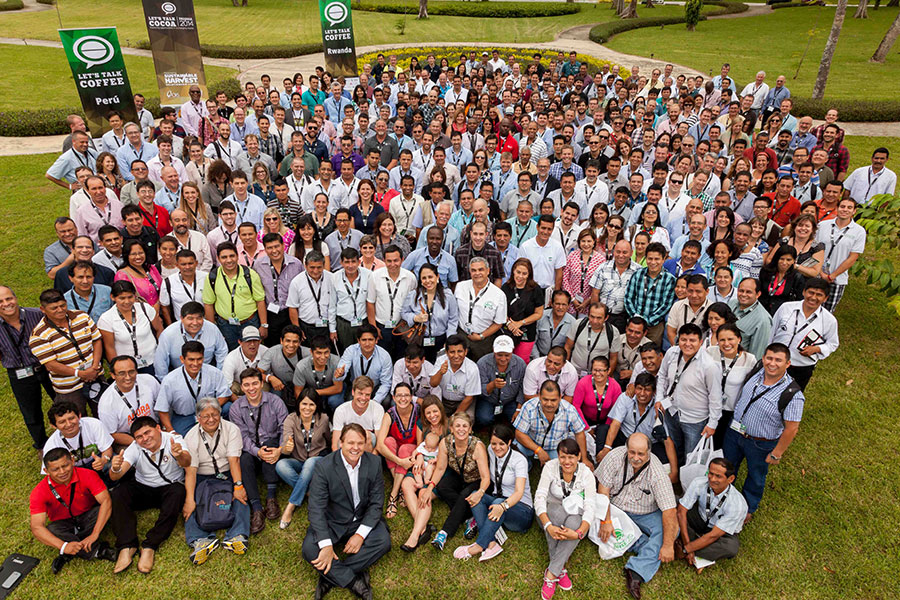Coffee is a global product with billions of cups being drunk daily around the world. While most people appreciate their coffee as a secondary focus to reading their morning newspaper or as the backdrop to a great conversation at a coffee shop, David Griswold (pictured above, right) decided there were too many unnecessary middlemen involved in getting that cup of coffee to your table – many with a vested interest in keeping the supply chain opaque as a way of maximizing their profits. This moment of realization started with a knock on his door in 1989. Griswold was in Mexico City and a volunteer for the National Coordination Body of Coffee Farmer Cooperatives, his personal goodwill mission as a volunteer in the developing world before returning to the U.S. to get a master’s in business administration.
He had been hoping to answer a question that he’d been pondering over for a while: What work could I do to make a difference in the world? Griswold opened the door to find a man with deep lines etched in his leathery face. “He introduced himself as Pedro and at once thrust a plastic bag of coffee still in parchment into my hands,” recalls Griswold. “I have come from an ejido (communally owned land) in the state of Nayarit,” he began, “on behalf of 40 families who grow coffee.
We are told we have very good coffee. Can you help us find a way to sell it?” There was a note of cautious optimism in his voice. The Berlin Wall had just fallen in the West and in Mexico coffee prices had tumbled too because the Cold War coffee quota and pricing system run by the International Coffee Organization was no longer in place. Coffee prices had held firm for decades through a managed supply-demand system, but that had just ended.
As a result, prices went into a tailspin, dropping from $1.20 a pound to below $0.50. Griswold’s year of relaxed pondering was about to end. When he examined the coffee beans that Pedro had brought, he immediately saw that they were still in parchment: a peanut-like layer around the coffee seeds – inside which are the beans that are later roasted. Griswold knew little about coffee, but he knew that receiving un-milled coffee beans as a sample was something a coffee broker in New York would reject outright. “He didn’t know how to prepare the coffee sample for the American coffee market and I realized these farmers needed to understand the rules of engagement in a global market,” says Griswold.
As Griswold thought about Pedro’s question, he saw a path for his future come into focus. “At that time I I did not have a clear vision for my life’s work,” he says. “In asking his question, Pedro had answered mine. I knew then I would spend my life helping farmers find a sustainable market for their coffee and teaching them to succeed in supplying that market.” 
And so Relationship Coffee was born, a direct trading relationship model far ahead of its time. The business ethos aimed to understand coffee farmers’ point of view while giving them tools to better understand the market. Griswold had no earlier coffee or business background, so intuitively he established an environment of transparency that included all parties in the supply chain. It was an unheard-of business model in a volume-driven commodity world where a single-cent-per-pound differential could make the difference between a sale and a year of unsold product.
But his idea of full transparency was a leap of faith that has paid off hugely: Sustainable Harvest is now the largest organic fair trade coffee importer in North America. Consumer awareness around coffee has grown immensely in recent years, and the beverage is already a mature industry within the sustainability sector compared to many other commodities.
Today, the transparency that Griswold started in the early years has resulted in actual Facebook relationships between farmer and consumer. “At the outset people didn’t know who they were selling to and people didn’t know who there were buying from,” says Griswold. “Coffee is a little like wine, it’s something that people have become fascinated with and want to know more.” He points to the fact that when he started 25 years ago, coffee was simply “coffee.” No statement of origin, no fancy names and no branding with long stories of how it came about. George Clooney had yet to become the face of Nespresso and restaurant menus had yet to develop tongue-twisting lists of exotic-sounding varieties of Arabica coffees.
Coffee has historically been associated with social discourse. During the French and American Revolutions people had heated conversations in coffee houses, that would later form into political movements. Griswold is of the opinion that the close tie between social debate and coffee originally made the industry one of the first to inspect global supply chains. “Our most useful tool was building an iPad application that allowed farmers to taste coffee and share their results with their customers thousands of miles away. It’s called Tastify®, and it develops a common language of taste that is highly visual and can be translated into a language of their choice,” says Griswold.
A Tastify workshop, held anywhere in the world, can capture the coffee cupping (tasting) notes and make it available in multiple languages for the benefit of tasters in other countries. Has it paid off financially? “Yes it has,” says Griswold. “It’s not as profitable as being involved in traditional importing though. If you look at the value chain of any commodity the importing part will never be the most profitable.”
While companies might net 7-10% in profit, Griswold expects to only gross that amount and net around 1%. But that is fairly standard for commodity importers and why only big companies tend to survive. “We’ve still stayed in business,” he says. “We’ve been profitable for the last 15 years and been growing fast.”
His modesty stops him from mentioning that Sustainable Harvest has also made the Inc. 5000 list for the last five years, an amazing accomplishment when considering that Griswold reinvests up to half his budget back into training programs and offices at origin to help coffee farmers. “I wanted to share back more than just a tiny amount of pre-tax profit towards training farmers,” he says “For me it’s not a corporate social responsibility donation, but rather a central part of our mission. It’s a big part of why we’re still in business today. “Cost and production is often not covered along the way,” says Griswold.
“It’s impossible to make long-term investments in the current coffee market. Everybody’s wondering how to change something as big as global agriculture and make it better for the growers. I only know from my own experience, but what I’ve learned is that to solve big problems, you have to do it one relationship at a time.”





































